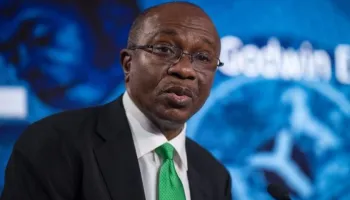COVER
Old Naira Notes: Emefiele Insists on January 31 Deadline

By Tony Obiechina, Ubong Ukpong & Eze Okechukwu, Abuja
The Central Bank of Nigeria (CBN) and members of the National Assembly may be heading for collision, as the apex bank yesterday insisted that there is no going back on the January 31 deadline for use of old naira notes, the same day the lawmakers called on the apex bank to extend the deadline by six months.
Speaking yesterday, after the Monday Monetary Policy Committee (MPC) meeting in Abuja, CBN Governor, Godwin Emefiele said that the January 31 deadline to stop the circulation of old naira notes would not be extended.
Emefiele stated that the 90-day ultimatum given to Nigerians to deposit their old currencies was enough.
“We called on the Deposit Money Banks (DMBs) to extend their working hours, and to work on weekends.
“There is no reason to talk about a shift. The new currencies are available,” he said.
Emefiele said the apex bank had mandated the DMBs to feed the new notes into their Automated Teller Machines (ATMs) for Nigerians to have equal access.
“We have increased disbursement of the new notes to them. There is adequate quantity of new notes available.
“Our mint is producing and we are supplying the banks. We have super agents in underserved areas like riverine communities, and CBN staff members have been out on mobilisation.
“We believe that by January 31, the new naira notes would have permeated the nooks and crannies of the country,” the CBN boss added.
Emefiele said the CBN had so far received about N1.5 trillion of the old naira notes.
He urged Nigerians to accelerate the process of taking their old notes to the banks before the deadline, adding that they should not fear harassment from security operatives.
“We have begged the EFCC and the ICPC to allow Nigerians deposit their old naira notes,” the CBN Governor said.
Yesterday, the Senate and the House of Representatives, urged the Central Bank of Nigeria, CBN to extend the mop-up of old Naira notes to the next six months.
Specifically, the Red Chamber asked the apex bank to extend the deadline for the expiration of the old Naira notes to 31st July, 2023.
The upper chamber also urged the CBN to open an exchange window where people that don’t have bank accounts to deposit their old notes to do so.
The senate’s resolutions were sequel to a motion by Sen. Sadiq Suleiman (APC-Kwara) during yesterday’s plenary.
Moving the motion, Suleiman recalled that the Senate in its resolution on Dec. 28, 2022, urged the CBN to extend the use of the old notes from Jan. 31 to June 30.
He said that however, the apex bank had insisted on terminating the use of the old naira notes by end of January
Suleiman lamented that there was not enough new naira notes in circulation and as such, moved that the date should be extended to July 31.
“Experiences around the world have shown that such abrupt decision if not controlled usually created chaos.
“The CBN should extend the use of the old notes to July 31,” he said.
Supporting the motion, Sen. Ibrahim Hadejia (APC-Jigawa) said that the call for extension was for their constituents and not for their (lawmakers) personal benefits.
“In my constituency, no Automated Teller Machine (ATM) is dispensing the new notes,” Hadejia said.
Similarly, Sen. Adamu Aliero (PDP-Kebbi) said that the policy would inflict untold hardship on people living in the rural areas.
“The CBN governor should be invited,” he said.
Sen. Adamu Bulkachuwa (PDP-Bauchi) said that the extension was necessary otherwise there would be chaos.
Sen. Biodun Olujimi (PDP-Ekiti) who decried that in her local government area, about 90 per cent of the people have not seen a glimpse of the new naira notes, called on the apex bank to “look away from the elections”.
She said that if the date was not extended, it would lead to collateral damage which would not augur well for the economy.
Sen. Mohammed Ndume (APC-Borno) called on the Senate to use its oversight responsibility on the CBN to “order the CBN governor to extend the date.”
He said that the power of the senate should not be played down calling on the senators to stand firm on the call for extension.
For Sen. Sam Egwu (PDP-Ebonyi) who was the only senator who opposed the motion, “Nigerians do not have the culture of keeping their money in the bank.
“It is in Nigeria where cash is used arbitrarily; other countries use electronic means.
“Nigerians are just averse to change,” Egwu said.
In his remarks, Senate President, Ahmad Lawan, said that most of the senatorial districts did not have banks.
“In rural Nigeria, there are no banks and people transact businesses with cash more often.
“There is no doubt that we must have window for exchange. We must have policies by the CBN to have bank branches established in rural areas.
“We need this extension for the most ordinary Nigerians,” Lawan said.
Also yesterday, the House of Representatives, summoned commercial bank operators and the Governor of Central Bank of Nigeria (CBN), Godwin Emefiele, over the scarcity of the new naira notes.
This is sequel to the adoption of a motion of urgent public importance brought before it by Rep. Sanda Soli (APC-Katsina) at the plenary in.
In his motion, Soli said that all over the world, currencies were being ‘phased out’ and not ‘forced out’.
“I am of the view that our currencies are being forced out and there is the need for some reviews and sensitisation by CBN and non-bank promoters,” he said.
The lawmaker called for review of the cashless policy, adding that CBN should ensure price stability.
Although Soli said that the cashless policy was in tandem with global best practices, he, however, added that most banks in Nigeria did not have what it takes to ensure that such was achieved.
He decried what he called the CBN’s refusal to listen to the cry of Nigerians for the extension of the Jan. 31 deadline for the deposit of the old naira notes, stating that this might have negative effect on the economy.
Speaker of the House of Representatives, Rep Femi Gbajabiamila, said that as good as the policy was, the modus operandi and the timing were the problem.
Gbajabiamila said that the currency should be phased out gradually, such that Nigerians would use the old and new naira together.
“There is nothing wrong in reviewing a policy; banks are claiming they don’t have the new naira notes, while CBN is also claiming the banks have them,” he said.
The speaker said that banks’ managing directors should be invited to brief the leadership or the ad-hoc committee to find out whether the money was available or they are being hoarded by banks.
The House, however, called for a six-month extension of the deadline to make the new notes available and that President Muhammadu Buhari should intervene on the debacle in the interest of Nigerians.
The House also set up an ad-hoc committee, led by Rep. Alhassan Ado-Doguwa, to meet with bank operators.
COVER
SEC Grants `No Objection’ to First HoldCo N323.4bn Shares Transaction

By Tony Obiechina, Abuja
The Securities and Exchange Commission (SEC), said it has granted a “no objection” to First HoldCo Plc’s N323.4 billion shares transaction.The Commission in a statement signed by the Head External Relations of SEC, Efe Ebelo said the decision was taken about the transaction after due consideration and in full compliance with applicable requirements.
Ebelo said in Abuja on Thursday, that there were no subsequent requests for additional information from the Central Bank of Nigeria (CBN) following the conclusion of the transaction. According to her, it is important to note that the Commission’s correspondence with the operators involved was not a query.”Rather, it was an automated compliance mechanism designed to promote transparency and ensure proper conclusion of large transactions within the market.”The SEC remains firmly committed to its mandate of regulating a fair, orderly, and efficient market; protecting investors; and fostering capital formation in Nigeria,” she said.Recall that the transaction, executed on the Nigerian Exchange Limited (NGX) on July 16, involved 10.43 billion shares sold at N31 per share.Barbican Capital Limited, Leadway Group, and their affiliates had sold approximately 10.43 billion ordinary shares in First HoldCo Plc in a single off-market block transaction at N31.00 per share, worth N323.4 billion.Barbican Capital offloaded a total of 7,786,641,500 shares at N31.00 per share valued at N241.3 billion.Leadway Assurance, sold 2,288,798,807 shares worth N70.8 billion at a price of N31.00 per share.The buyer, according to First HoldCo Plc was RC Investment Management Limited, a separate and independent investment firm.First HoldCo Plc had reiterated its commitment to transparency and regulatory compliance, assuring investors and the public of its dedication to open and timely communication.“We remain guided by best practices in corporate governance and continue to prioritise accountability to our shareholders and stakeholders,” the company said.COVER
Herders Launch Fresh Attack on Benue Community

From Attah Ede, Makurdi and Jude Dangwam, Jos
I’m yet another round of attack, armed herders have invaded Uikpam community, in Human LGA and Benue state where a farmer was beheaded and his body dismembered.It was gathered that the armed herders stormed the community at about 9.
00AM on Thursday, morning and started shooting sporadically before capturing a farmer, who was on his farm. Former special assistant to former Benue State governor, Jimin Geoffrey, confirmed this ugly development to journalists on phone in Makurdi. He said the bandits “Also beheaded the victim and also cut off one of his hands and took it away”.Benue State has been under intense attacks by armed herders, who have been causing chaos in many parts of the country.Just a month ago, the armed herders launched an attack on Yelwata community in Guma LGA, killing over 200 persons and displaced several others.Youths Decry Humanitarian Crisis in Riyom, seek InvestigationThe Berom Youths Moulder-Association has called for the constitution of an independent panel of investigation to clearly identify the individuals and collective roles of the security agencies in the recent attacks that claimed the lives of 27 locals in Riyom LGA of Plateau State.The Bare National President, Solomon Mwantiri on Thursday at the NUJ Press Centre described the recent killings at Bindi/Jebbu of Riyom Local Government Area in the early hours of July 14, where 27 people lost their lives with property worth Millions of Naira destroyed, livestock carted away, stressing that it is a clear case of coordinated operations on the local communities in the state.According to the President, “The following facts are now evident from the Bindi/Jebbu massacre of 14th July, 2025 is the undeniable receipt and acknowledgement of early warning from stakeholders to the Sector 6 Commander of Operation Safe Haven-OPSH, Lnt Col Thomas Paave.”27 people lost their lives, many injured property worth Millions of Naira destroyed, livestock carted away and over 2447 people displaced with others. Bindi/Jebbu is serviced by at least 2 nearby Military posts, which are less than 3 kilometres away from both ends.”Bindi/Jebbu is situated along a trunk-A Federal road. Therefore, complaints over the terrain or accessibility to the village by operatives of Operation Safe Haven is inexcusable. The 27 killed and the related destruction of property occurred within the same vicinity where the Reinforcement Team stationed itself before and during the attack.” He notedThe youths maintained that the claim that the Federal High-Way was blocked by the attackers such that another reinforcement team could not pass according to Lt Col Thomas Paave, the Sector 6 Commander of Operation Safe Haven-OPSH is not only ridiculous, but also unbelievable.”The Sector 6 Commander of Operation Safe Haven-OPSH claim that his men were overwhelmed to the extent that none of the attackers were apprehended, wounded or neutralized is yet another puzzle that needs to be unraveled.”Among their demands are the need to constitute an “Independent panel of Investigation to clearly identify the individuals and collective roles as well as find out and unravel the level of compromise and complacency of the Sector 6 Commander, Lnt Col Thomas Paave as and the Reinforcement Team that was deployed.”Perpetrators and their sponsors should equally be identified and openly prosecuted. There should be Justice and adequate compensation for victims and their families.”The President noted that the Ministry of Humanitarian Affairs and Poverty Reduction should extend its humanitarian intervention scheme to the families of the deceased, the injured, the Internally Displaced Persons-IDPs and other villagers that suffered grievous destruction of their crops and farmlands.”We also demand the immediate unconditional release of our youths, who are under continued unlawful detention after indiscriminate arrest made in Sagas/Gyembus, Jol, Gwon and other places without arrangement as this constitutes a gross violation of their fundamental human and other constitutional rights enshrined in the 1999 Constitution of the Federal Republic of Nigeria (as amended) and other International Instruments that guarantee rights of human persons irrespective of ethno-religious and geographical definitions,” they stated.COVER
APC Ready for 2027 Poll, Declares Nentawe Yilwatda, New National Chairman

By Johnson Eyiangho, Mike Odiakose, Abuja and Attah Ede, Makurdi
The National Executive Committee (NEC) of the All Progressives Congress (APC) has appointed Professor Yilwatda Nentawe, former Minister of Humanitarian Affairs and Social Development, as the party’s substantive National Chairman.
Nentawe’s emergence was confirmed during the 14th NEC meeting held at the State House Conference Centre in Abuja. The motion to ratify his appointment was moved by the Chairman of the Progressive Governors’ Forum and Imo State Governor, Hope Uzodimma, and seconded by Speaker of the House of Representatives, Tajudeen Abbas. He was immediately sworn in at 2:50 p.m. in the presence of top party stakeholders.The new APC chairman, who hails from Plateau State and was the party’s governorship candidate in the 2023 elections, succeeds Abdullahi Ganduje, who stepped down last month citing health reasons. Until now, Deputy National Chairman (North), Ali Bukar Dalori, had been serving in an acting capacity.Party stakeholders had anticipated that NEC would formalize Dalori’s acting role and set a timeline for an elective convention. However, the party opted for a direct appointment of Nentawe instead.Nentawe Declares APC Ready for 2027Shortly after assuming office, Professor Nentawe declared that the APC is already well-positioned for a landslide victory in the 2027 general elections. He pledged to unify and strengthen the party, likening the National Working Committee (NWC) to mechanics tasked with overhauling and steering the APC—“the vehicle”—to success.“All of us here, especially the National Working Committee, we are the mechanics. The party is a vehicle—we will fix it, we will drive it, and ensure we reach the destination of our choice,” he said. “By God’s grace, 2027 is a done deal for APC.”He called on members to embrace unity and collective effort, promising to transform the APC into a party of national pride.Nentawe also extended an open invitation to opposition politicians and other Nigerians, encouraging defections and wider membership. “Our doors are open to welcome new members—governors, senators, local government chairmen. We will expand beyond bounds,” he assured.Yilwatda Brings Strategic Experience, Says MorkaAPC National Publicity Secretary Felix Morka, in a statement, highlighted Yilwatda’s diverse background, describing him as a “prolific academic” and seasoned administrator. He noted that the new chairman had previously served as Director of ICT at the Federal University of Agriculture, Makurdi, Resident Electoral Commissioner in Benue State (2017–2021), and Director-General of the Tinubu-Shettima Campaign in Plateau during the 2023 elections.“We welcome and congratulate our National Chairman on his election and pray God grants him the wisdom and grace to lead our great party to greater heights,” Morka said.Alia Hail New APC National ChairmanBenue State Governor, Rev. Fr. Hyacinth Alia has felicitated with Prof. Nentawe Yilwatda Goshwe, on his election by the National Executive Committee (NEC) of the All Progressives Congress (APC), as the party’s new National Chairman.Prof. Nentawe, the Minister of Humanitarian Affairs, was unanimously elected by the APC NEC on Thursday, July 24th, 2025.He now replaced Dr. Abdullahi Ganduje, who resigned in June, 2025, over personal and health reasons.Alia, who describes Prof. Nentawe Goshwe Yilwatda as a distinguished academic and a visionary leader, maintained he has no doubt in the ability of the Plateau State born scholar and politician to succeed in taking the party to more enviable heights.The Governor cited the new Chairman’s intellect, brilliance, expertise, integrity and his unwavering commitment to excellence, as some of the qualities that will draw more admiration and attract more support and love for the ruling All Progressives Congress across the country.The governor in a statement by his Chief Press Secretary, Tersoo Kula, wished the former Benue State Electoral Commissioner and the All Progressives Congress candidate for the 2023 Plateau Governorship election all the best as he steers the affairs of the All Progressives Congress (APC) as its National Chairman.PDP Holds National Convention Nov 15The Elective National Convention of the Peoples Democratic Party (PDP) to elect the next set of National Officers of the party will hold on Saturday, 15th to Sunday, 16th November, 2025 in Ibadan, the Oyo State Capital.In a communique issued at the end of PDP 101 NEC meeting on Thursday, NEC directed the National Chairman, Amb. Iliya Damagum and the National Secretary, Senator Samuel Anyanwu to officially write to inform the Independent National Electoral Commission (INEC) of the time, venue and agenda of the Elective National Convention.This in accordance with the requirement of Section 82 (1) of the Electoral Act, 2022 and Part 2(12) of the Regulations and Guidelines for Political Parties, 2022.”Accordingly, NEC approved the membership composition of the National Convention Committee as well as the membership composition of the National Convention Zoning Committee to ensure a successful, transparent and credible Elective National Convention.Meanwhile, NEC adjourned and fixed its next (102nd) meeting to Monday, 25th August, 2025.Six state Governors – Plateau, Zamfara, Taraba, Osun, Bauchi and Adamawa, attended the NEC, while their Oyo State counterpart, Seyi Makinde sent in words. Enugu and Bayelsa States Governors were absent.Before the 101 National Executive Council (NEC) went into closed door session, Acting National Chairman of PDP, Amb. Umar Damagum, noted that some members of the party have learned the truth in the most uncomfortable way as many who jump from one side to the other had returned.”Some even claim they have never left. With this, I want to leave a word that what you see here today, the serenity, the calmness and the composure of this NEC, attests to the fact that PDP is still one and works even stronger. I want to use this opportunity to welcome all of you,” he said.The Chairman of the PDP BoT, Senator Adolphus Wabara, said the successful outcome of the party’s forthcoming convention will define the political landscape, and urged members to work towards the success of the exercise.Wabara also expressed the hope that Convention will produce leadership that would create confidence and make many members who have left the party to retrace their steps.Represented by former Governor of Kaduna State, Ahmed Makurfi, who is also the Secretary of BoT, Wabara further urged PDP members to guide their utterances as efforts to win back defected members continue.He said, “For one reason or another, people may feel hurt or injured. We should not make it worse than what it is.”I believe that a very successful convention producing leadership that creates confidence will lead to a lot of people to retrace their steps. Nigeria is waiting for us. The outcome of our convention will define the political landscape, I assure you.”He added, “The BOT has always supported other organs of the party and especially our governors in building consensus and unity in moving the party forward. This very important meeting (101 NEC) that many thought would not take place is here taking place constitutionally, legally recognised.”We know of our internal issues and we have always had capacity to deal with our internal issues. I believe even those who have taken a trip, the majority will be temporary.”In his comments, Bauchi State Governor, Bala Mohammed, and Chairman, PDP’s Governors’ Forum, said, “This is not a time for abuse” but sympathised with those who became impatient and left.”While we still leave the door ajar for them to come in when they wish to, within a time limit, we will not continue to condone indiscipline.Mohammed described PDP as a party with a history, logo that has not changed over the years, saying the party has shown resilience.”We don’t have to make a lot of noise or cause more disparaging issues. We are working behind the scenes, behind the NWC, behind the BOT, the Caucasus of the National Assembly, and the State Chapters to ensure that we remain intact and provide a credible platform for Nigerians to actualise their aspirations,” he said.





























